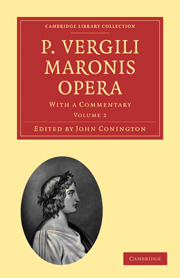Summary
Like its predecessor, this volume is the result of considerable labour, labour too of a kind which tends to diminish an author's confidence in his work. A commentator on Virgil is not likely to feel that those difficulties which weighed heavily on him while engaged on the Eclogues and Georgics have become fewer or less formidable when he passes to the Aeneid. To grapple with his subject thoroughly, he is still required to be an aesthetical judge of language, a Latin scholar, if not a philologer, a competent textual critic; and though no longer expected to display a knowledge of agriculture and rural life, he has to exhibit instead an acquaintance with mythology and legend, with Roman antiquities and Roman history. Virgil is confessedly one of the most learned of poets: and a commentator who would do him justice1 ought to be still more learned. The learning of a poet, even when extensive and multifarious, may be desultory, uncritical, inexact: he may show ignorance as well as knowledge, but he will be a learned poet still. It is the business of a commentator to understand both that knowledge and that ignorance: and his learning accordingly ought to be accurate, searching, and profound. I need not say how little I profess to approach the ideal which the nature of my work keeps of necessity continually before my mind.
- Type
- Chapter
- Information
- P. Vergili Maronis OperaWith a Commentary, pp. v - xivPublisher: Cambridge University PressPrint publication year: 2010



